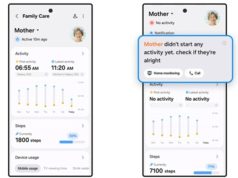DAILY VIDEO: Samsung to send out Note7 software update to totally disable charging; Microsoft releases Visio Viewer diagram tool on iPad Tablets; Backdoors, Zero-Day flaws found in IoT cameras made by Sony, others; and there’s more.

Today’s topics include Samsung’s decision to distribute a software update that disables charging on recalled Galaxy Note7 smartphones, Microsoft’s release of its Visio Viewer for iOS, security researchers’ discovery of significant vulnerabilities in surveillance video cameras and why Google has given third-party developers access to its virtual digital assistant technology.
Determined to get remove the last of its dangerously defective Galaxy Note7 smartphones off the market, Samsung has put out the word that it will distribute a software update that will permanently prevent recharging the batteries.
Samsung reports that 93 percent of Note7 owners have turn in their phones. But Samsung wants owners to return or stop using the remaining 7 percent. To make sure that happens, the company is issuing an update that will prevent the phone from charging its batteries.
“To further increase participation, a software update will be released starting on Dec. 19 and will be distributed within 30 days,” Brenna Eller, Samsung Corporate Communications stated, in the company’s official statement. “This software update will prevent U.S. Galaxy Note7 devices from charging and will eliminate their ability to work as mobile devices.”
Visio diagrams leap from the desktop and land on Apple’s tablet in the company’s new viewer app for iOS. Microsoft has released public previews of its Visio Viewer for iPad and Visio Online, the company announced on Dec. 8.
Visio is used by millions of users to visualize everything from simple organizational charts to complex processes. The advent of high-resolution touch screens, like the one used in the Apple’s iPad tablet line, encouraged Microsoft to develop a native viewing app that preserves the visual detail provided by the Visio desktop software.
Two security researchers working separately are warning consumers and enterprises that network-connected video cameras from different manufacturers are not secure from hackers, after researchers found vulnerabilities and backdoor code in the devices that could allow attackers to create internet-of-things botnets or spy on the users.
In a research note published on Dec. 6, security firm SEC Consult stated that 80 models of cameras sold under the Sony brand have a backdoor that could allow attackers to take complete control of the devices.
In a separate study published the same day, researchers for security firm Cybereason detailed their discovery of two zero-day vulnerabilities in white-box video cameras sold under various brand names on sites such as Amazon and eBay.
Hundreds of thousands of devices connected directly to the Internet are vulnerable, and even more may be accessible through a peer-to-peer service, Amit Serper, principal security researcher with Cybereason, told eWEEK.
When Google announced Assistant, its digital assistant technology earlier this year, CEO Sundar Pichai described it as critical to the company’s effort to enable a more conversation-based and artificial intelligence-centric computing model in coming years.
Now Google has opened Actions on Google, which is the development platform for the Google Assistant, to third-party developers. Assistant is Google’s version of digital assistants like Amazon’s Alexa, Microsoft Cortana and Apple’s Siri in that it allows users to engage with applications and services using ordinary conversation.
Google has said that it will integrate Assistant into pretty much all of its hardware products in the next few years including tablets and smartphones and its Google Home voice-activated speaker and digital assistant.






